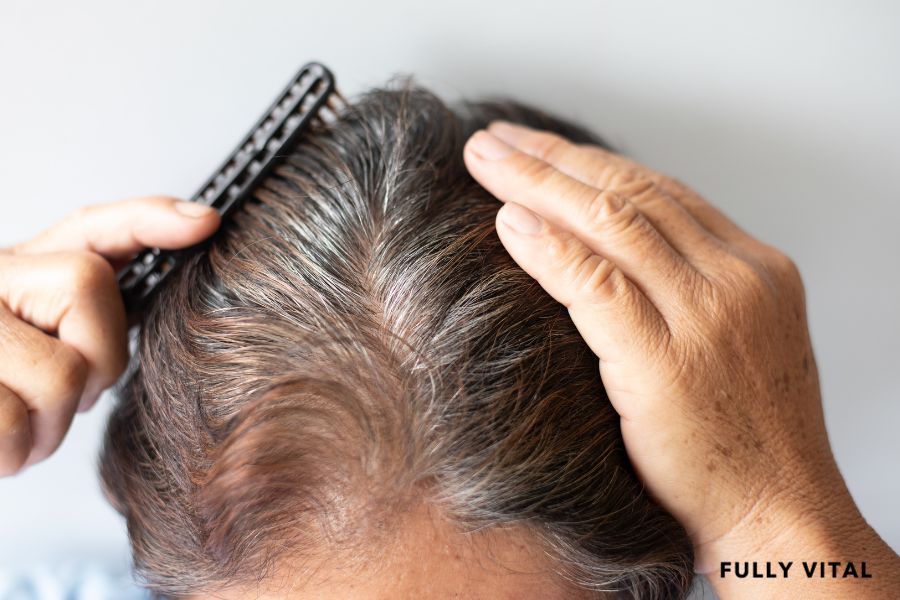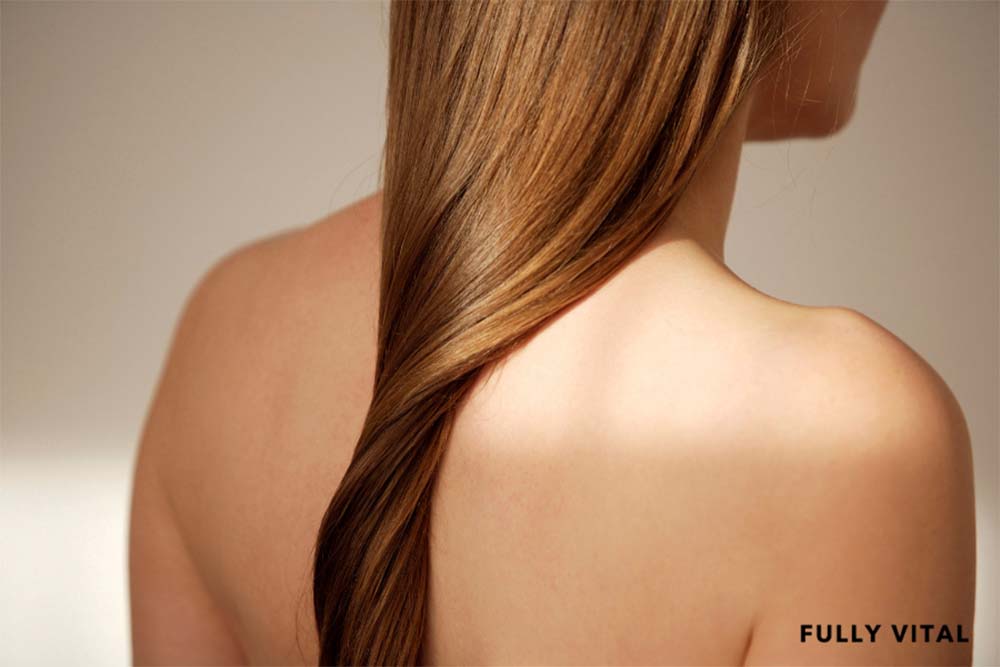
Fact Or Fiction: Does Wearing Hats Cause Hair Loss?
If you're among the many women eager to promote healthy hair growth, you've probably heard the age-old myth that wearing hats can lead to hair loss.
But is there any truth to this claim?
In this article, we'll get into the topic to help you separate fact from fiction.
So, let's get started!

I LOVE MY HAIR NOW
FullyVital hair serum and hair vitamins made tremendous improvements in my hair. I truly love my hair now.
Dorit S.,
Effects Of Tight Hats On Hair Loss
One common concern is whether wearing tight hats can contribute to hair loss.
It is true that regularly wearing overly tight hats can cause tension in the hair follicles, leading to a condition known as traction alopecia.
Traction alopecia occurs when the hair is constantly pulled or tugged, damaging the follicles and resulting in hair loss.
However, it's important to note that this type of hair loss is usually temporary and can be reversed by avoiding tight hats and giving your hair a break from any excessive tension.1
Hat Friction And Its Role In Hair Loss
Another factor that is often associated with hair loss is hat friction.
Constant rubbing of the hair against the hat can cause breakage and weaken the hair shaft, leading to hair loss over time.
To minimize the risk, it is recommended to wear hats made from soft materials like cotton or silk, as they create less friction.
Additionally, giving your hair regular breaks from wearing hats can help prevent any potential damage caused by friction.
Benefits Of Preventing Hair Loss From Hat
Preventing hair loss from hats offers several benefits, including:
Maintaining Hair Volume
By adopting proper hat-wearing habits and minimizing hair damage, you can help maintain the volume and thickness of your hair over time.2
Preserving Scalp Health
By ensuring a clean and well-hydrated scalp, you reduce the risk of scalp issues that can lead to hair loss.
This contributes to overall hair health and appearance.
Boosting Confidence
Maintaining a healthy head of hair can boost self-esteem and confidence, helping you feel your best in any situation.
How Hat Usage Duration Affects Hair Loss
The duration of hat usage does not directly cause hair loss.
It is the factors mentioned above, such as tightness, friction, and hat style, that play a significant role in hair health.
However, wearing hats for long periods without giving your hair a break can increase the risk of hair damage.
It is advisable to periodically remove your hat throughout the day to allow your scalp and hair to breathe.

Impact Of Hat Styles On Hair Loss Risk
Certain hat styles, such as those that are excessively tight, have a high crown or have sharp edges, can increase the risk of hair loss.
These styles can create added pressure on the hair and scalp, resulting in hair breakage and thinning.
Opting for hats with a looser fit or adjustable sizing can help reduce the risk of hair loss associated with specific hat styles.

The Role Of Hat Hygiene In Preventing Hair Loss
Maintaining good hat hygiene is essential for overall hair health.
Wearing a dirty hat can lead to scalp infections, which can cause hair loss.
It is recommended to regularly clean your hats, especially if you sweat excessively or have an oily scalp.
Washing your hats with a gentle detergent and allowing them to air dry can help prevent any potential scalp issues that could contribute to hair loss.
What Are The Alternatives To Wearing Hats To Prevent Hair Loss?
If you're concerned about the potential effects of wearing hats on your hair, there are alternative options to consider.
These alternatives can help prevent hair loss while still allowing you to protect your hair and maintain your style:
- Headscarves: Opt for headscarves made of silk or satin, as they create less friction and minimize hair breakage. These materials are gentle on the hair and reduce the risk of damage compared to some hat materials.
- Hair Accessories: Explore stylish hair accessories like headbands, hair clips, or turbans that can protect your hair without creating excess tension or friction. These accessories offer versatility and can be used to style the hair without causing any harm.
- Hair Care Products: Use hair care products designed to promote hair growth and strengthen hair follicles, such as serums, oils, or shampoos. These specialized products can nourish the hair, improve its health, and reduce the risk of hair loss associated with hat-wearing.3
- Hairstyling Techniques: Embrace protective hairstyles that don't require the use of hats, such as braids, buns, or updos. These hairstyles keep the hair secure and protected without putting excessive strain on the hair follicles.
Experience The Power Of Timeless Tresses With Fully Vital!
Ready to transform your relationship with your hair? Discover the secret to lasting vitality today!" |
Final Thoughts On Does Wearing Hats Cause Hair Loss
The belief that wearing hats causes hair loss is a topic that has been surrounded by myths and misconceptions for many years.
However, by examining the facts and dispelling these misconceptions, we can confidently state that wearing hats alone does not directly cause hair loss.
Understanding the factors that can contribute to hair loss, such as tightness, friction, hat style, and hat hygiene, allows us to make informed decisions about our hair care practices.
At Fully Vital, we believe in providing accurate information and empowering individuals to take control of their hair health.
Our range of hair growth products is designed to stop the aging of your hair, promoting healthier locks and a more positive relationship with your hair.
By combining proper hair care practices with our high-quality products, you can nourish and revitalize your hair to achieve the luscious locks you desire.
Don't let the fear of hair loss deter you from expressing your personal style through hats.
Embrace your love for fashion and protect your hair by choosing hats that fit comfortably, are made from soft materials, and practice good hat hygiene.
Remember, wearing hats should be a fun and stylish way to accessorize, not a source of worry about your hair.
Take care of your hair, wear your favorite hats with confidence, and enjoy a vibrant and healthy relationship with your locks.
Frequently Asked Questions About Does Wearing Hats Cause Hair Loss
Is it true that hats restrict hair growth?
No, hats themselves do not restrict hair growth.
However, wearing hats excessively tight or for extended periods can lead to tension on the hair follicles, which may result in hair breakage and thinning.
It's important to choose hats that fit comfortably and allow your scalp and hair to breathe.
Does wearing hats daily cause hair loss?
Wearing hats daily does not automatically cause hair loss.
However, factors such as tightness, friction, and hat style can contribute to hair loss over time if not properly managed.
It's advisable to give your hair regular breaks from wearing hats and choose hats made from materials that minimize friction.
Are bald spots caused by wearing hats?
Bald spots are not typically caused solely by wearing hats.
However, consistently wearing tight hats that exert excessive pressure on the hair follicles can contribute to a condition known as traction alopecia.
This condition, characterized by hair loss due to tension or pulling, can result in bald spots in the affected areas.
Can hats cause dandruff and hair loss?
Wearing hats alone does not cause dandruff.
However, wearing dirty hats or failing to practice good hat hygiene can contribute to scalp infections, which may manifest as dandruff.
These scalp conditions, if left untreated, can potentially lead to hair loss.
Do hats affect the natural oils in the scalp and cause hair loss?
Hats can absorb and trap some of the natural oils produced by the scalp, potentially leading to greasier hair.
However, this does not directly cause hair loss.
Regular washing of hats and maintaining good hat hygiene can help prevent excessive oil buildup and potential scalp issues.
Is hair loss reversible after wearing hats?
Hair loss caused by wearing hats, particularly traction alopecia, can be reversible if detected and addressed early.
By reducing tension on the hair follicles, practicing good hat hygiene, and following proper hair care routines, the hair can often recover and regrow.
However, it's important to consult with a healthcare professional or dermatologist for personalized advice.
Do hats cause traction alopecia?
Yes, wearing hats that are too tight or exert excessive pressure on the hair follicles can cause traction alopecia.
This condition is characterized by gradual hair loss resulting from constant tension or pulling.
Choosing hats with a looser fit and avoiding prolonged wear can help prevent the development of traction alopecia.
Can hats cause itching and hair loss?
Wearing hats, especially those made from materials that do not allow proper ventilation, can cause sweating, itching, and scalp irritation for some individuals.
Persistently scratching the scalp due to itching can damage the hair and potentially lead to hair loss.
Opting for hats made from breathable materials and maintaining good scalp hygiene can help prevent these issues.
Do hats suffocate hair follicles?
Hats themselves do not suffocate hair follicles.
However, wearing hats that are overly tight or made from materials that trap heat and moisture can create an environment that is not ideal for hair health.
It's important to choose hats that allow proper air circulation to the scalp and avoid constant pressure on the hair follicles.
Are certain hat materials more likely to cause hair loss?
Certain hat materials, such as rough or coarse fabrics, may increase the risk of hair breakage and damage.
Hats with internal seams or sharp edges can also contribute to hair loss.
Opting for hats made from soft materials like cotton or silk can help minimize friction and reduce the likelihood of hair loss.
Sources:
- Traction alopecia: Causes, treatment, and prevention. (2018, January 18). Www.medicalnewstoday.com. https://www.medicalnewstoday.com/articles/320648
- Nestor, M. S., Ablon, G., Gade, A., Han, H., & Fischer, D. L. (2021). Treatment options for androgenetic alopecia: Efficacy, side effects, compliance, financial considerations, and ethics. Journal of Cosmetic Dermatology. https://doi.org/10.1111/jocd.14537
- Gavazzoni Dias, M. F. (2015). Hair cosmetics: An overview. International Journal of Trichology, 7(1), 2. https://doi.org/10.4103/0974-7753.153450







